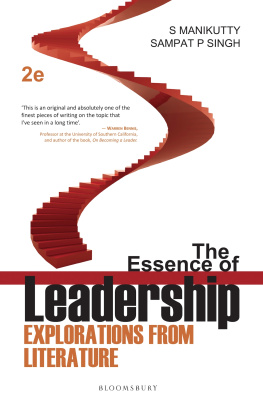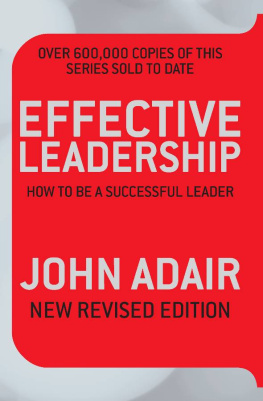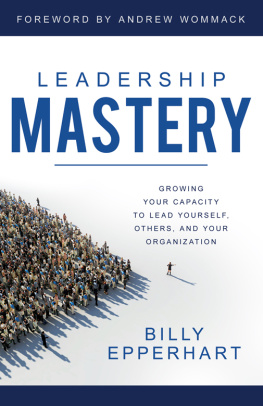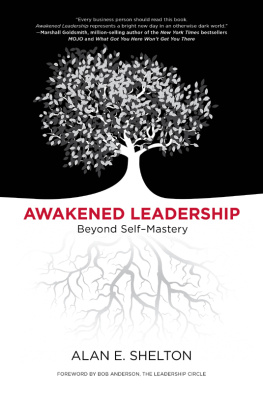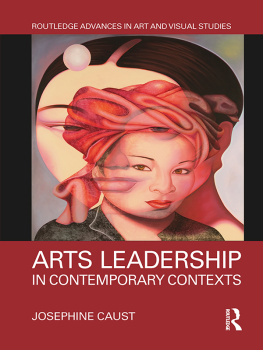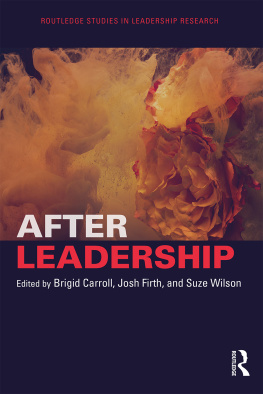Table of Contents

The Essence of Leadership
The Essence of Leadership
Explorations from Literature
(Second Edition)
S. Manikutty
Sampat P. Singh

Copyright 2015 Bloomsbury Publishing India Pvt Ltd
All rights reserved.
No part of this publication may be reproduced or transmitted in any form or by any means, electronic or mechanical, including photocopying, recording, or any information storage or retrieval system, without prior permission in writing from the publishers.
No responsibility for loss caused to any individual or organization acting on or refraining from action as a result of the material in this publication can be accepted by Bloomsbury India or the authors/editor.
Bloomsbury Publishing India Pvt Ltd
Second Floor, Building No. 4,
DDA Complex, Pocket C 6 & 7, Vasant Kunj
New Delhi 110 070
E-ISBN: 978 93 86250 28 5
Created by Manipal Digital Systems.
The content of this book is the sole expression and opinion of its author, and not of the publisher. The publisher in no manner is liable for any opinion or views expressed by the author. While best efforts have been made in preparing this book, the publisher makes no representations or warranties of any kind and assumes no liabilities of any kind with respect to the accuracy or completeness of the content and specifically disclaims any implied warranties of merchantability or fitness of use for a particular purpose.
The publisher believes that the content of this book does not violate any existing copyright/intellectual property of others in any manner whatsoever. However, in case any source has not been duly attributed, the publisher may be notified in writing for necessary action.
This book is dedicated to,
K.V. Narayana Iyer and Geetha
Explorations from Literature
Pradip Khandwalla
This is an intriguing, path-breaking book. The authors, Professors Manikutty and Sampat Singh, both with technical backgrounds, who later taught management at the Indian Institute of Management, Ahmedabad, have highlighted the shortcomings of an overly technical view of management education, and have argued persuasively for dipping into the humanities (literature, the arts, philosophy, culture, religious studies, spirituality) to gain insights into what it is to be a leader.
They distinguish between leaders and run-of-the mill managers. As they say, Leaders create a group of people who are not merely willing but, even, wanting to accomplish certain tasks (p. 1). The authors bring emotion to the center stage in management teaching: Developing a comprehensive model that can deal with the complexity of higher order decision making requires, not only powers of analysis, but also understanding of emotions (p. 16). Their humanistic approach to leadership development in management revolves around four cornerstones: development of a compelling vision with a passion for it; development of character; development of a holistic perspective, with an ability to make tradeoffs among conflicting demands that reconcile what may seem to be irreconcilable opposites; and an endless process of self-development (p. 23). The authors explain, with the help of examples from the lives of great leaders, as well as from literature, what vision is, and the passionate commitment to it, what character is (value anchors that produce consistent conduct) and how character develops, what is a holistic perspective, and how leaders manifest such a perspective, what is self-development, and how humanities can facilitate self-development.
In Chapter 2, the authors counter-pose two Weberian ideal types: the leader and the manager. The manager, at least the one trained in a business school, tends to be immersed in facts and data, analysis, tools and techniques, optimisation of results for given goals, resources, and tools, and is coldly rational. The manager tends to be somewhat averse to riskcalculated risk taking is okay, but venturing out into uncharted terrains is not. There is no larger vision of life than getting ahead through promotions and job changes, and earning more and more. The leader, on the other hand, is a dreamer, who concretises his or her dream into a compelling vision of what can be created or transformed, and is passionately committed to it. The leader understands emotions, respects them, and evokes fierce following by projecting a grand vision, and demonstrating coherence between thoughts, words, and deeds, that appeal to the idealism and desire for a meaningful life in the followers.
The authors set out an agenda of change from a managerial persona to a leader persona: from a manger of facts and data, to a manager of emotions; from a manager of emotions to a generator of emotions; from a follower of standards, to a setter of standards, and from a realist, to a dreamer. For this transition to occur, some steps are vital: knowing oneself; becoming ones true self; and deciding what to become in the future, and taking appropriate steps. Literature helps the putative leader by offering, not virtuous role models, but insights into how protagonists struggle with their dilemmas and conflicts, make choices, grow in the process (or fail to grow), and arrive at an integrative vision that they are committed to (or fail to arrive at such a vision, and remain stuck in their mental blocks). The authors use several classics to help students gain insights, which can propel them towards leadership. These include Bernard Shaws play Saint Joan, the Mahabharata, Cervantes Don Quixote, the Nigerian author Chinua Achebes Things Fall Apart, Ibsens The Wild Duck, and A Dolls House, Girish Karnads Tughlaq, Visakhadattas Mudrarakshasa, Herman Hesses book Sidhartha, Arthur Millers play All My Sons, and Bertolt Brechts play Life of Gaileo. The pedagogy is not aimed at arriving at answers, but at stimulating questions about the actions, postures, and motivations of the protagonists, and thus, prompting similar questions about ones own self. There is, at the end of each story, a section on its interpretation, and on highlighting some key issues.
Like any good book, this one too provokes questions and concerns. Dont leaders also need to learn from the worlds thought leaders? Dont Marx, Freud, Darwin, Russell, Dewey, Adam Smith, Sartre, Gandhi, Tagore, Nehru, and Mao, have perspectives to offer that can enlarge and enrich the vision of potential leaders? MBA students get some exposure to economics and to social psychology in their courses on organisational behaviour. But what about anthropology, which is the study of human cultures, sociology with its models of social stratification, social stability, and evolutionary and revolutionary change, and political science, with its authority-related ideologies and political systems? Shouldnt management students get an exposure to thought leaders and social sciences? What about philosophy and the questions that it poses, about what is truth and how can it be known, and what is good and what is bad?
Management students are trained to be good convergent thinkers, that is, to have clarity on goals, use rigorous analysis to reach them, keep a sharp focus on key issues, try to find optimal solutions, and so forth. But what about creative, divergent, and out-of-the-box, lateral thinking? Should they not get an exposure to the processes of creative thinking and models of creative achievement in a globalising, highly-competitive world, in which past solutions have increasingly shorter shelf life?

